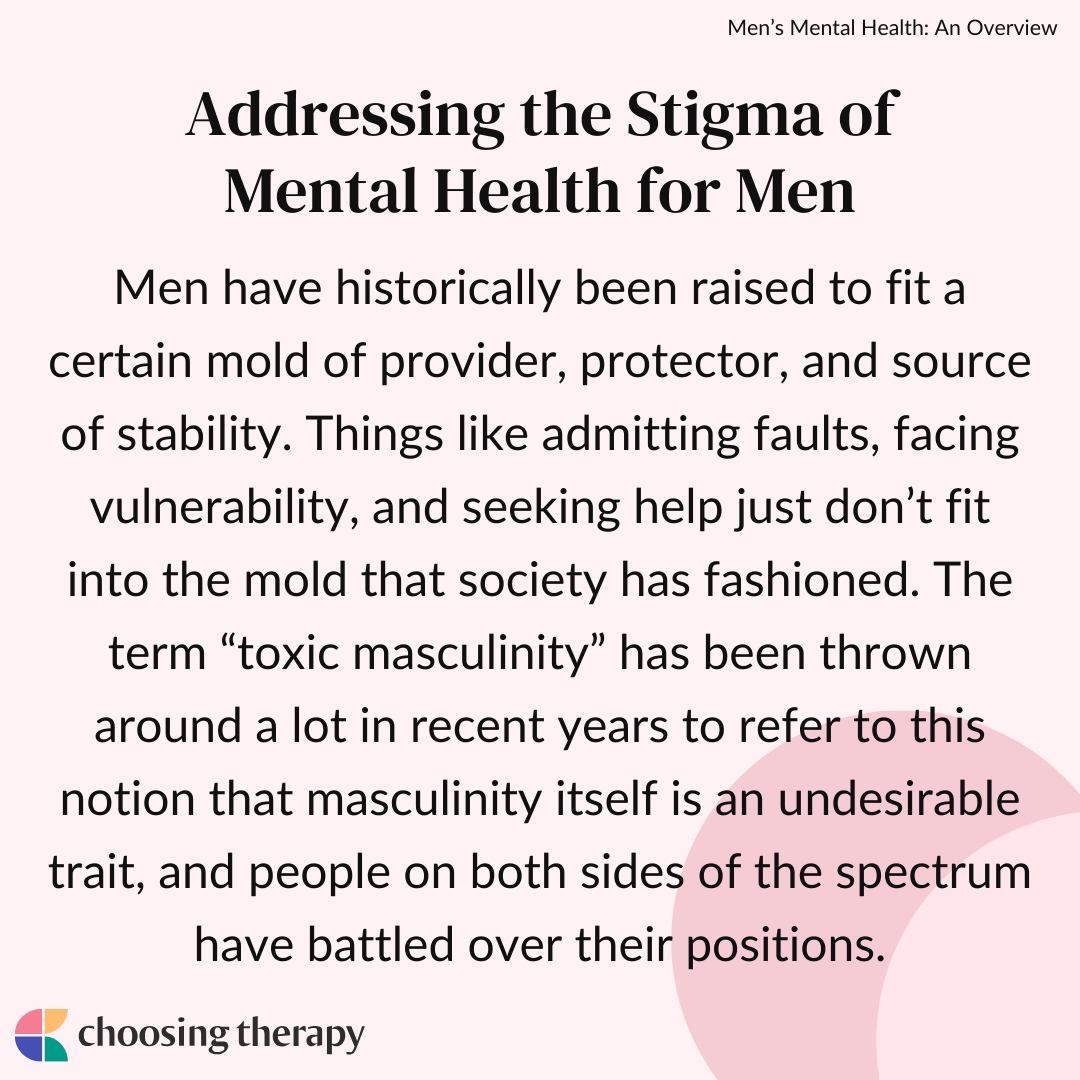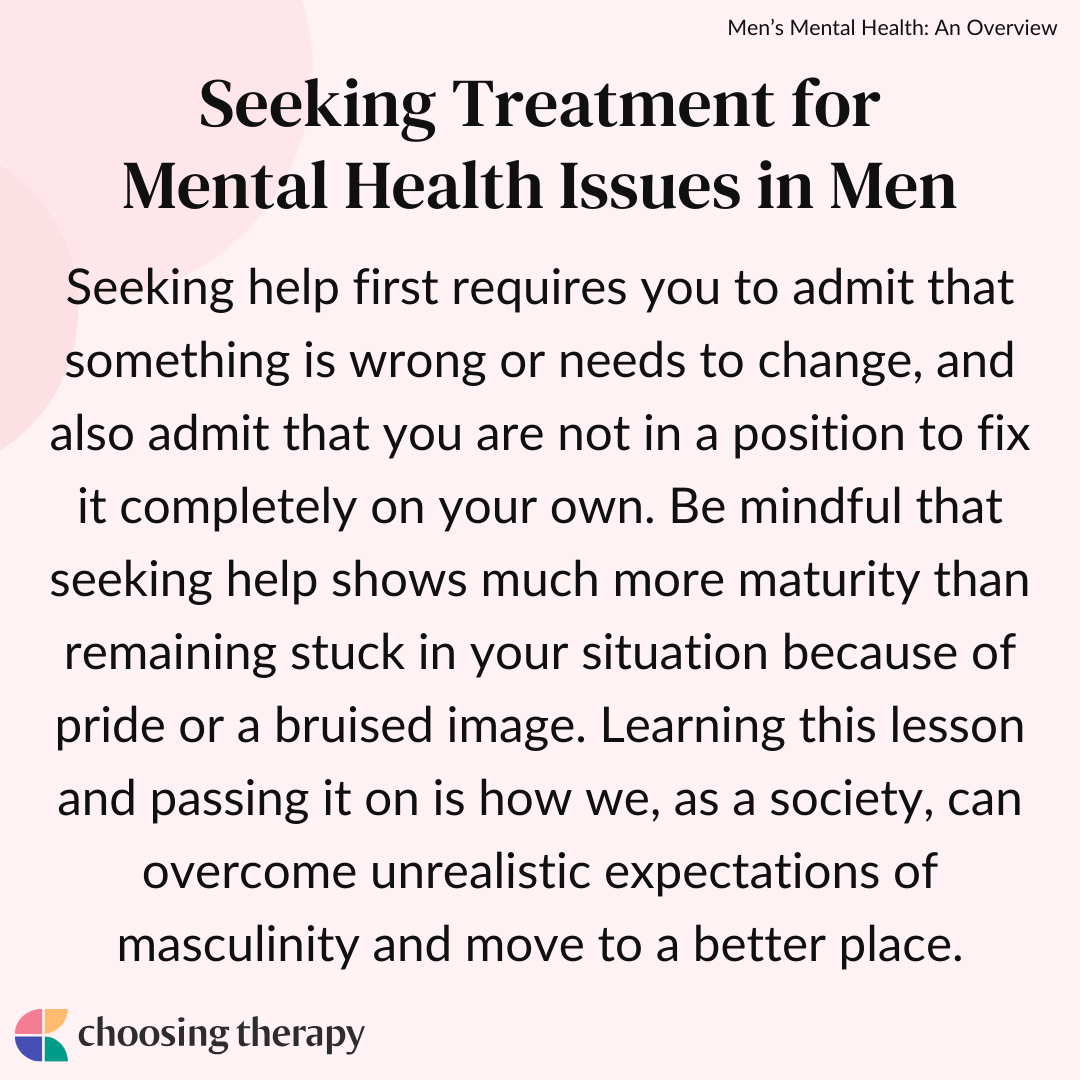Men experience mental health issues at similar rates to women. Men are often faced with a lot of stigma about mental health issues, and as a result may be reluctant to seek treatment. There’s no shame in seeking treatment for men’s mental health, and knowing what issues you are dealing with can be a great first step.
Why Is Talking About Men’s Mental Health Important?
Despite the increased awareness we’ve had in talking about mental health, men are often left out of the conversation. Men often struggle with their feelings in silence, and it’s common for them to believe they need to “get over it” or “toughen up.” Talking about men’s mental health benefits everyone: themselves, their loved ones, and society at large.
By encouraging men to talk about their mental health, we promote a sense of inclusivity. We model that everyone’s mental health matters, and this continues to help destigmatize the need for treatment. Finally, talking about mental health can save lives. When people get the care they need, they are more likely to function better themselves and take better care of others.
Would you like to try therapy? BetterHelp has over 20,000 licensed therapists who provide convenient and affordable online therapy. BetterHelp starts at $65 per week. Take a Free Online Assessment and get matched with the right therapist for you.
Why Don’t Men Talk About Mental Health?
Men undoubtedly struggle with their mental health, with research showing that 35% of males believe they’ve had a diagnosable mental health condition at some point during their life. But one study found that 40% of men never spoke to anyone about their mental health, and about 1/3 of them simply felt too embarrassed to talk about it.1
Talking about mental health rarely feels easy. With that, it’s important to note that many factors impact how comfortable men feel when it comes to opening up about their struggles. Toxic masculinity, for example, can keep men acting in stereotypical “tough, masculine” ways. In addition, cultural and familial norms may keep men guarded when it comes to expressing their emotions.
Men’s Mental Health Statistics
It is an understatement to say that mental health struggles in men is a topic fraught with stigma and weighty cultural norms. While there are many reasons for this, it’s important to know the facts when it comes to mental health among men.
The following are facts and statistics related to men’s mental health:2,3,4,5,6
- Nearly 1 in 10 men experience anxiety or depression on a daily basis, but less than half of those men will ever seek treatment.
- 60% of men will experience a traumatic event in their lives, compared to 50% of women. Men are more likely to experience accidents, physical assault, combat, disaster, or to witness death or injury.
- Globally-speaking, 75% of those who die by suicide annually are men.
- In the United States, white males accounted for almost 70% of deaths by suicide in 2019.
- About 16.3% of males 18 and older in the US were diagnosed with a mental illness in 2019.
- Only about 36% of males with a mental illness in the US actually receive treatment.
Men & Suicide
75% of those who die by suicide annually worldwide are men.4 Suicide is also the 2nd leading cause of death in the USA for those 12-24 years old, with LGBTQ+ people being twice as likely to attempt suicide than their heterosexual peers.8 One reason for this is that impulsivity and violence tend to be higher in males, leading them to be more likely to engage in riskier behavior, and complete suicide if attempted. Not only this, but males tend to be less likely to seek treatment for mental health conditions and are more likely to abuse substances, which can worsen depression.
There are options for getting help if you find that you are thinking about suicide.You can always call the national suicide prevention hotline at 800-273-8255 for quick support and guidance. If you know someone who is dealing with thoughts of suicide, be sure to get them help as soon as possible.
Depression in Men
Nearly 1 in 10 men experience anxiety or depression on a daily basis, but less than half of those men will ever seek treatment.2 Depression in men can have serious and fatal consequences. Depression is typically treated with a combination of pharmaceutical intervention and traditional therapy, usually a cognitive behavioral therapy approach.
Substance Use in Men
Within the last year, about 22% of men have used illegal drugs or misused prescription drugs. About 11% of males aged 12-20 reported binge-drinking in 2018.9 We know men seek treatment at lower rates, which makes it more likely that substance use disorder goes untreated in much of the male population. Substance abuse can complicate other mental health conditions, as well as promote risk-taking behaviors.
Typical treatment options for substance abuse include detoxification programs through in-patient hospitalization, intensive outpatient hospitalization programs, outpatient substance abuse therapy, and maintenance/accountability programs such as 12-step programs like Alcoholics Anonymous, Narcotics Anonymous, or Celebrate Recovery.
Anger Issues in Men
It may surprise you that both men and women experience anger at similar rates. However, the expression or anger and issues stemming from the inability to cope with anger is where differences are found. Men are much more likely to be diagnosed with intermittent explosive disorder than women.1 The typical treatment options for anger issues in men is a combination of medication and psychotherapy focused anger management.
Anxiety in Men
About 2% of men in the USA are diagnosed with generalized anxiety disorder, and roughly 20% of men will experience an anxiety disorder in their lifetime.11,13 Men can develop anxiety symptoms for a variety of reasons from environmental, such as chronic stress from a job or living situation or poverty, to medical, such as having a heart condition or abnormal testosterone levels. Anxiety is typically treated with psychotherapy, medication, and lifestyle changes.
Trauma & PTSD in Men
About 60% of men will experience a traumatic event in their lives.3 Men are more likely to experience accidents, physical assault, combat, disaster, or to witness death or injury. How someone deals with trauma influences the outcome.
Some men will experience an acute set of symptoms immediately following a trauma, usually diagnosed as acute stress disorder. However, some will develop symptoms of post-traumatic stress disorder, which has longer-term implications. The treatment options for both are similar, in that they involve psychotherapy treatment usually focused on desensitization to triggers, and processing through the trauma. Usually, a trauma-informed, cognitive behavioral approach is used.
Bipolar Disorder in Men
2.3 million Americans are affected by bipolar disorder, and an equal amount of men and women develop the illness.12 Treatment for bipolar disorder consists primarily of pharmaceutical interventions paired with psychotherapy.
Eating Disorders in Men
Men make up 10% of the population dealing with anorexia and bulimia, and 35% of those with binge-eating disorder.12 It is much less likely for men to seek treatment for eating disorders, even though it can be just as destructive in men as women. Eating disorders are typically treated through psychotherapy.
While there can be elements of body image involved in eating disorders, men tend to use food as either a way to obtain a sense of control, or a way of coping with other emotions.
Specific Concerns for Black & BIPOC Men
BIPOC men often experience significant barriers when it comes to talking about and seeking treatment for their mental health. For example, while Black and Hispanic American men have similar rates of mental health issues as other Americans, only one-quarter of them have ever sought treatment. Many value working with same-race providers, but only 4% of psychologists are Black, making it harder to find a Black therapist, with similar struggles for finding a Latinx therapist.14
There is no doubt structural racism also plays a serious role in mental health. Treatment is affected by implicit bias within healthcare systems, and higher poverty rates correspond with lower accessibility to care. In addition, BIPOC men are far less likely to be represented in mental health research. This means that evidence-based treatments that fare well for others may not yield the same results for them.14
Top Rated Online Therapy Services Online-Therapy.com – Great Alternative In addition to therapy, all Online-Therapy subscriptions include a self-guided CBT course. Visit Online-Therapy.com Online-Therapy.com – Great Alternative In addition to therapy, all Online-Therapy subscriptions include a self-guided CBT course. Visit Online-Therapy.com
Addressing the Stigma of Mental Health for Men
Men have historically been raised to fit a certain mold of provider, protector, and source of stability. Things like admitting faults, facing vulnerability, and seeking help just don’t fit into the mold that society has fashioned. The term “toxic masculinity” has been thrown around a lot in recent years to refer to this notion that masculinity itself is an undesirable trait, and people on both sides of the spectrum have battled over their positions.
The real mental health stigma comes from expectations, both perceived and actual, that society in general and men’s families of origin have set up. “Masculinity” refers to the idea of what it means to be a male. There’s no set definition of masculinity other than what we give it. Therefore, masculinity is what you believe it is. Unfortunately, many men are raised to believe that being a man means being stoic in nature, unflinching, brave to a fault, and unneeding of assistance.7
The reality of what it means to be a man is different for each man, and changes with time. The idea of masculinity will change with time and society. What we do with the here and now, however, depends on us. Are we going to hold ourselves to unrealistic expectations of manhood, or create our own image of what it means to be a man?
Seeking Treatment for Mental Health Issues in Men
Seeking help first requires you to admit that something is wrong or needs to change, and also admit that you are not in a position to fix it completely on your own. Be mindful that seeking and getting help and moving forward shows much more maturity than remaining stuck in your situation because of pride or a bruised image. Learning this lesson and passing it on is how we, as a society, can overcome unrealistic expectations of masculinity and move to a better place.
There are lots of ways to find the right therapist or get more information on men’s mental health. One of the easiest and fastest ways to connect with someone is through an online therapist directory. A therapist can help any man get help for whatever mental health issues they may be facing.
Therapy for Men
Therapy can help men improve their mental health and increase their overall functioning. When you first meet with your therapist, you two will discuss what’s been going on in your life and collaborate to establish initial treatment goals. You will likely meet around once a week, and your sessions will focus on helping you meet these goals.
Coping Strategies That Can Help With Men’s Mental Health
It’s important for all men to identify and implement healthy coping strategies during difficult moments. Challenging emotions are inevitable, and it’s important to learn how to handle them gracefully. Remember that it may take practice to reap the benefits, but the more you commit to using these skills, the more intuitive they become.
Here are some coping skills that can help you on your mental health journey:
- Relaxation techniques: Deep breathing, mindfulness, and striving to relax your body when you feel overwhelmed can make a significant difference.
- Get active (bonus points for getting outside): Exercise can improve your mood, and there are numerous benefits associated with spending time outside each day.
- Cut down on alcohol: Alcohol can worsen your mental health, especially if you drink chronically. Consider cutting down or stopping.
- Develop stronger social connections: It’s important to nurture your relationships with friends and family. If you struggle with social connectivity, commit to prioritizing buildinging a stronger support system.
How to Help a Man With Mental Health Concerns
The best way to help a man with a mental health concern is to listen to him and take him seriously if he’s telling you he’s having a hard time. As noted before, it’s rare for a man in today’s society to open up about his struggles. Offer support if you’re capable, or help finding some support for him, including any of the resources listed above like a therapist or support group.
Most importantly, don’t comment negatively about important things he is opening up about, or downplay his issues. Men get enough of people saying “man up” in some way or another, and laughing about serious issues rarely leads to someone getting help. Ultimately, if he’s open to seeking some help, encourage him to do just that.
To help our readers take the next step in their mental health journey, Choosing Therapy has partnered with leaders in mental health and wellness. Choosing Therapy is compensated for marketing by the companies included below. Online Therapy BetterHelp Get support and guidance from a licensed therapist. BetterHelp has over 20,000 therapists, who provide convenient and affordable online therapy. Complete a brief questionnaire and get matched with the right therapist for you. Get Started Psychiatry, with you in mind Talkiatry Our Psychiatrists Can Diagnose Your Condition, Prescribe Medication, And Monitor Your Progress. Most psychiatry visits cost patients $30 or less* Free Assessment Drinking Moderation Sunnyside Want to drink less? Sunnyside helps you ease into mindful drinking at your own pace. Think lifestyle change, not a fad diet. Develop new daily routines, so you maintain your new habits for life. Take a 3 Minute Quiz Relationship Help OurRelationship (Free Couples Course) OurRelationship has been proven to help couples improve communication, intimacy, and trust. 94% would recommend it to a friend. Get Started Mental Health Support Group App Circles Anytime, anonymous, and free. Never feel alone during life’s greatest challenges. Drop-in to live conversations and share thoughts, ask questions, or learn from others on the same journey. Join Circles Now Free Prescription Discount Card Optum Perks Save up to 80% on most prescriptions. Optum Perks provides discounts at over 64,000 pharmacies nationwide. No memberships or costs to you, ever. It’s really that easy. Get your card and start saving. Get the discount card! *Includes copayment, deductible, coinsurance, and $0 Visits. Excludes no shows.Additional Resources
For Further Reading
- If you think you or a loved one may be in immediate crisis, call the National Suicide Prevention Hotline for resources and support at 800-273-8255.
- Mental Health Self-Test from Mental Health America
- Man Therapy | Men’s Mental Health Resources
- Movember – Men’s Health – Mental health and suicide prevention
- Mental Health & Well-being
Online Anxiety Test A few questions from Talkiatry can help you understand your symptoms and give you a recommendation for what to do next. How Does ERP Help With Intrusive Thoughts? Obsessive compulsive disorder (OCD) is a psychiatric condition marked by the presence of obsessive thoughts, images, doubts, or urges, followed by compulsive behaviors or acts aimed at easing the distress caused by the obsession. While the content of the obsessions can take many forms, they are always repetitive, persistent, involuntary, and intrusive, and they often result in a great deal of anxiety for the person experiencing them.










